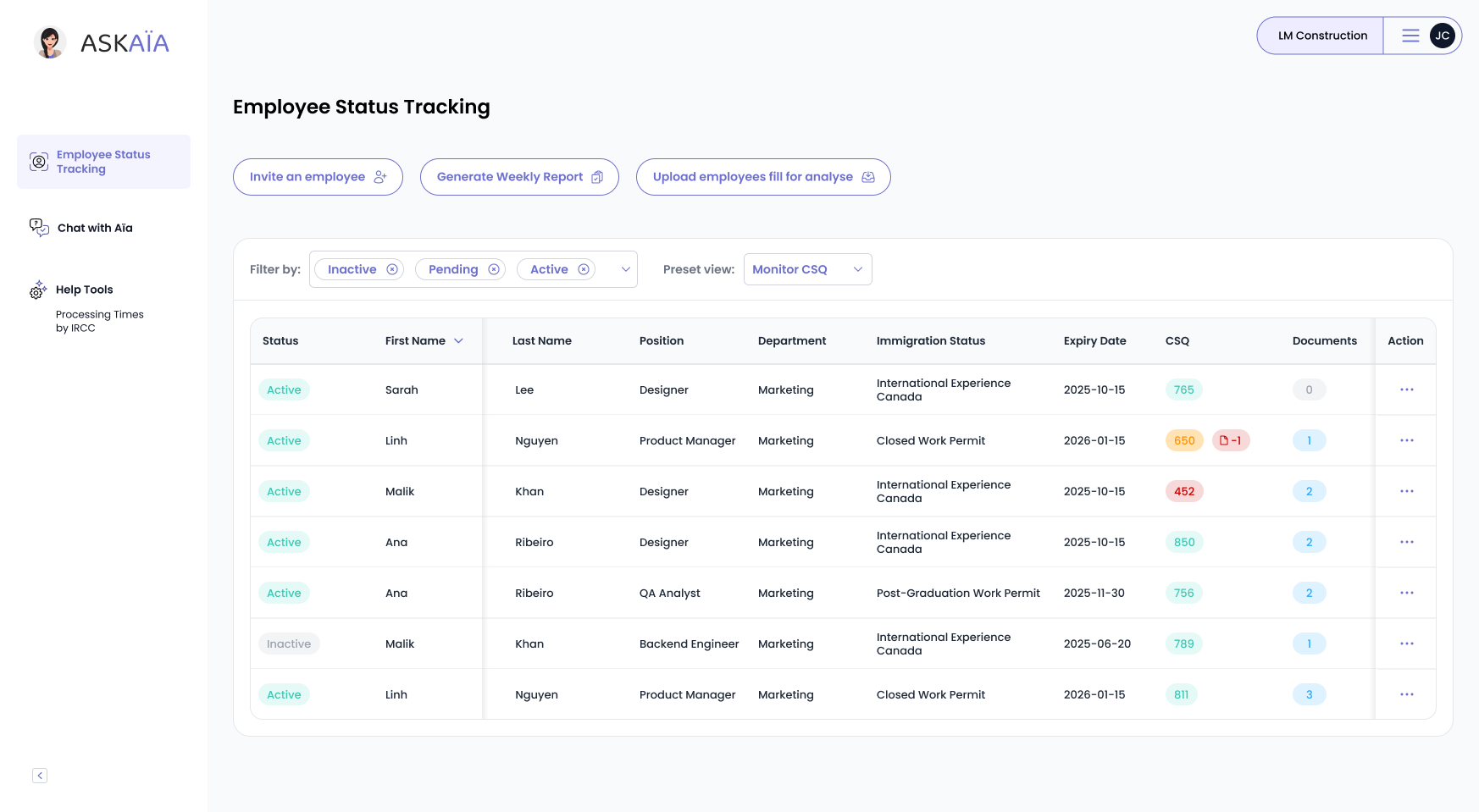Quebec: demographic decline or economic immigration?

Quebec's latest demographic report, published on January 16, 2025, sounds a warning. For the first time in recent history, the province is recording more deaths than births. This turning point raises a crucial question for the future of Quebec: will we face a demographic decline, with all its economic and social challenges, or will we choose to rely on economic immigration to ensure our prosperity?
This observation, far from being inevitable, places us at a crossroads. On the one hand, an unaddressed demographic decline threatens the vitality of our economy, undermines our healthcare and pension systems, and risks weakening Quebec's weight within Canada. On the other, immigration presents itself not as a simple solution, but as a genuine lever for growth, innovation and dynamism.
- Quebec's demographic challenge: Numbers that speak for themselves
- The case of Japan: an international perspective on demographic issues
- Immigration: a strategic asset for Quebec's future
- A promising future: Why Quebec needs you
- Conclusion: Immigration as a response to Quebec's challenges
1. Quebec's demographic challenge: Numbers that speak for themselves
Quebec is at a crossroads. The demographic balance sheet as of January 16, 2025 is clear: the population is aging, the birth rate is too low, and the working population is shrinking.
Fertility at half-mast: Renewal not assured, and regions particularly hard hit
With only 1.38 children per woman on average in Quebec, the province is far from the 2.1 rate needed to ensure the renewal of its population. Quebec's birth rate is in freefall.
Alarmingly, for the first time in 2023-2024, deaths exceeded births (-1150), and 12 of Quebec's 17 regions are particularly hard hit by this demographic decline. The situation is all the more worrying in that entire regions are seeing their populations decline, not just the major urban centers.
Accelerated aging: a growing burden
Already, 21.1% of the population is aged 65 and over, compared with only 16.8% in Montreal, and the average age has reached 42.8. This trend poses major challenges for the financing of pensions and healthcare services.
The Quebec economy under threat: Shortages and obstacles to growth
Demographic decline is already affecting the economy. The Quebec labor market is tight, and key sectors such as healthcare, construction and IT are short of workers. Fewer workers and an aging population also mean less consumption, and therefore an economic slowdown on the horizon. Public finances are under pressure to provide services to the population.
Taking action in the face of decline: Immigration as a solution
The facts are clear: Quebec cannot ignore its demographic challenge. To ensure its future prosperity, the province must find solutions. Among them, immigration is an essential lever for countering decline and boosting the economy. The declining birth rates in Quebec and Japan show us that we must look to immigration as a viable solution.
2. The case of Japan: an international perspective on demographic issues
Quebec is not an isolated case when it comes to the challenges of demographic decline. Japan, which has been facing similar trends for several decades, offers a relevant example for analyzing potential impacts and exploring possible solutions.
Marked demographic decline
Japan's population has been declining since 2010. Its fertility rate, at 1.26 children per woman by 2022, is comparable to that of Quebec. This situation has led to an accelerated aging of the population, with over 29% of Japanese aged 65 and over.
Investment in technology and automation
Aware of the challenges posed by its demographics, Japan has invested heavily in cutting-edge technologies, notably robotics and automation, to compensate for its shrinking workforce. The aim was to make up for the shortage of workers through significant productivity gains.
Gradual opening to immigration
Despite a long tradition of relative closure, Japan has gradually relaxed its immigration policies over the past two decades. Recognizing that technology alone could not fill the labor shortage, the Japanese government set up programs to attract foreign workers, particularly in shortage sectors. As a result, the number of foreign residents in Japan has doubled from 1.69 million in 2000 to over 3.41 million in 2024.
Tangible results, but persistent challenges
Increased immigration has helped to alleviate labor shortages in certain sectors in Japan. The presence of foreign workers has also stimulated consumption and contributed to economic growth. However, Japan continues to face challenges in integrating immigrants and adapting its social structures to a more diverse population.
Parallels with Quebec: lessons to be learned
The Japanese experience highlights the challenges and opportunities facing Quebec. Although the context is different, the two societies share similarities in terms of demographic decline, aging populations and workforce needs. Analyzing the choices made by Japan can provide valuable information for Quebec as it develops its own strategies, particularly with regard to the Quebec labor market.
3. Immigration: a strategic asset for Quebec's future
Faced with the demographic challenge, Quebec must consider sustainable solutions to ensure its future prosperity. When properly planned and managed, economic immigration is a strategic asset for countering the effects of demographic decline and stimulating growth.
Multiple economic benefits
The arrival of newcomers has a positive impact on many aspects of the Quebec economy:
- Filling labor shortages: Immigration helps alleviate labor shortages already affecting several key sectors of the economy, including healthcare, information technology and construction. At the end of 2024, the Quebec labor market was estimated to have 128,000 vacancies, underscoring the urgent need for skilled workers. Targeted immigration makes it possible to attract specific talents and skills that meet market needs, in all regions of Quebec.
- Stimulating innovation and entrepreneurship: Immigrants bring with them new ideas, diversified skills and an entrepreneurial spirit that foster innovation and the creation of new businesses. According to a study published by Statistics Canada in 2021, immigrants are 36.6% more likely to start a business than native-born Canadians.
- Supporting economic growth: By increasing the active population and stimulating consumption, immigration contributes to the growth of Quebec's GDP. A Scotia Bank study estimates that immigrants contributed C$36 billion to Quebec's gross domestic product (GDP) in 2021, representing around 9% of the province's total GDP.
Essential support for the social system
The demographic contribution of immigration has a direct impact on the sustainability of public services, and on Quebec's tax system. Without increased immigration, Quebec's worker-retiree ratio would be just 2.1 in 2040. However, according to a study by the Institut du Québec (2019), a more pronounced increase in immigration could raise this ratio to 2.3 workers per retiree in 2040.
Such a balance is essential, as too low a worker-retiree ratio would have several negative impacts on the tax system:
- Potential increase in tax rates: To maintain public services and social programs, the government could be forced to raise taxes on the remaining working population.
- Reduced tax base: With fewer workers than retirees, the government's tax revenues would shrink, limiting its ability to fund essential services.
- Pressure on tax credits: The government may have to review or reduce existing tax credits.
- Increased payroll taxes: Workers' payroll taxes could rise to fund pensions and health care for an aging population.
- More complex tax system: New tax measures could be introduced to encourage retirees to return to work.
- Impact on government benefits: Working retirees could see their benefits reduced, which could affect their decision to return to work.
In addition to these fiscal issues, the demographic contribution of immigrants contributes to the vitality of Quebec's regions and the maintenance of local services, such as schools. Young immigrant families play an essential role in revitalizing regional communities.
Beyond the numbers: Cultural enrichment
While the economic aspect is crucial, it's important to emphasize that immigration also contributes to the cultural and social enrichment of Quebec. The diversity of origins, perspectives and talents of new arrivals fosters openness, creativity and dynamism in Quebec society as a whole. Immigration is an essential component of the Québec identity.
A thoughtful approach to successful integration
It's important to emphasize that the benefits of immigration are maximized when it is well planned and accompanied by effective integration measures. To support new arrivals, Quebec has set up reception, francization and labor market integration programs.
4. A promising future: Why Quebec needs you
Quebec is at a crossroads, but this situation is also a source of opportunity. Immigration is an essential key to building a prosperous future, and today's Quebec welcomes talent from around the world with open arms.
An open and welcoming province: A place to thrive
Québec is renowned for its exceptional quality of life, cultural dynamism and openness to the world. While recent adjustments to immigration policies, such as the temporary pause in certain programs, may have raised questions, it is essential to remember that Quebec continues to welcome thousands of immigrants every year.
Opportunities for diverse profiles: Quebec needs your talent
Whether you're a skilled worker in a high-demand sector, an entrepreneur with an innovative project, a student ready to share your knowledge, or a graduate of a Quebec institution, there's an immigration program to suit your profile.
Québec needs your skills, experience and energy to meet the challenges of tomorrow, in every region of the province. Even if fluency in French is an asset, there are many ways to integrate and contribute to Quebec society.
Your Québec immigration journey: Resources to guide you
Navigating the immigration process can seem complex, especially with recent changes. To help you make sense of it all, AskAïa provides you with valuable tools and resources:
- Explore the 3 best immigration programs in Quebec right now, and discover the criteria and benefits of each option.
- Get complete and accurate answers on the Quebec Experience Program (PEQ ) by consulting our FAQ, an indispensable guide for graduates and temporary workers.
- Prepare your Express Entry profile step -by-step with our practical workshop led by an immigration expert, on January 29, 2025.
Conclusion: Immigration as a response to Quebec's challenges
Quebec is at a crossroads, and the choices we make now will shape its future. Faced with the demographic challenge, the province must act with determination and vision. This post highlights the crucial importance of immigration to Quebec's future. The data are clear: an aging population, a low birth rate and a negative natural balance pose major challenges.
Economic immigration is not only a solution to a demographic problem, it's also a powerful driver of growth, innovation and diversity. By welcoming talent from around the world, we can build a stronger, more inclusive and more dynamic Quebec.
If the Quebec adventure appeals to you, don't hesitate to check with Aïa about your best options for immigration to Quebec. Your contribution is valuable, and Quebec needs your dynamism, talent and commitment.

Let’s get your demo started
Book a demo
You May Also Like
These Related Stories

Canada in 5: December 2024 Changes to Foreign Worker Program
In December 2024, Canada will introduce major updates to the Temporary Foreign Worker Program. These changes aim to prioritize Canadian workers. Learn …

Canada in 5: Temporary Resident Reduction Plan Unveiled
This week, we delve into Canada's plan to reduce temporary residents by 2027, Prince Edward Island's measures to slow population growth, and Immaculat …

Canada in 5: Francophone Students Get a Direct Path to Residency
Canada's new initiative for francophone students offers a streamlined path to residency, supporting minority French-speaking communities nationwide. L …